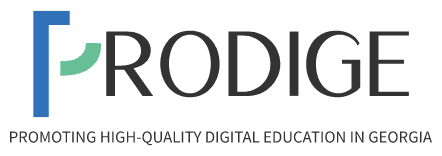Quality Assurance of Digital Education: Online Training for Georgian Universities
Dates: 22 April – 7 May 2025
Delivery Mode: Online (two-week course with two synchronous sessions and asynchronous homework)
Objectives
This international training programme aimed to build capacity in quality assurance (QA) of digital higher education among university representatives in Georgia. It focused on understanding and applying European and Estonian quality frameworks for digitally enhanced teaching and learning.
Profile of the Participants
The training brought together academic staff, instructional designers, and quality assurance professionals from various Georgian higher education institutions. Participants had diverse experience levels in digital education—from newcomers to seasoned experts involved in strategy and implementation.
Learning objectives and activities
The training programme was designed to deepen participants’ understanding of quality assurance in digital higher education. Through lectures, discussions, and practical assignments, participants explored European, national (particularly Estonian), and institutional frameworks for digitally enhanced teaching and learning. A central focus was placed on the Estonian Digital Education Quality Label model, which provided course-level quality criteria that participants used during the programme.
Throughout the training, participants analysed online or blended learning courses from their own institutions using a provided self-assessment template. This practical group work enabled them to apply theoretical knowledge in a real context, identify the strengths and potential areas for improvement of the selected courses, and reflect on their institution’s current practices. The results of these evaluations were presented and discussed in the second synchronous session, where experts provided feedback and facilitated dialogue.
In addition to course-level evaluation, the training encouraged participants to reflect more broadly on institutional strategies for digital education and the support structures available for academic staff. This created space to discuss both enablers and barriers to high-quality digital teaching and learning in Georgian universities, as well as strategic needs such as competence development, infrastructure, and regulatory frameworks.
Participants appreciated the informative and well-organized training, especially valuing tools like the matrix for evaluating online/blended courses, quality assessment tools, and the inclusive digital education content. They highlighted the relevance of topics, interactive learning environment, and practical usefulness for program design.
Representatives of Georgian universities suggested more face-to-face meetings with additional practical examples and to devote more time for future trainings.
The training was conducted by a team of experienced experts from Estonia:
• Dr. Liia Lauri, Head of Higher Education at the Estonian Quality Agency for Education (HAKA) and coordinator of the national Working Group on Quality of Digital Education;
• Veronika Rogalevitš, lead instructional designer at TTK University of Applied Sciences;
• Sille Paas, instructional designer at Tallinn University of Technology (TalTech). All three experts are actively involved in Estonia’s digital education quality initiatives and have extensive international experience in supporting the development of digitally enhanced learning.

